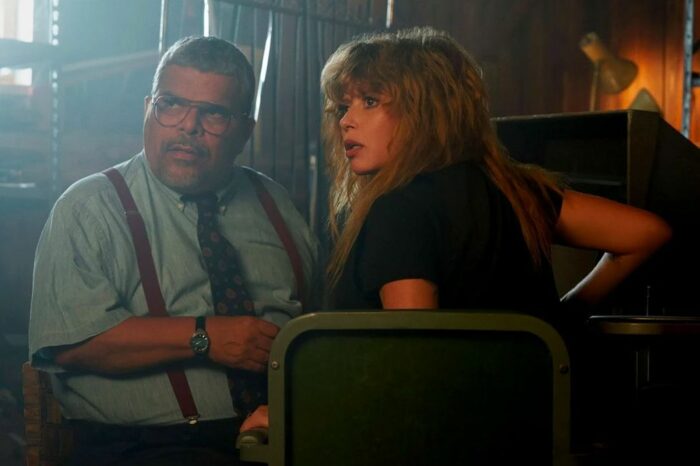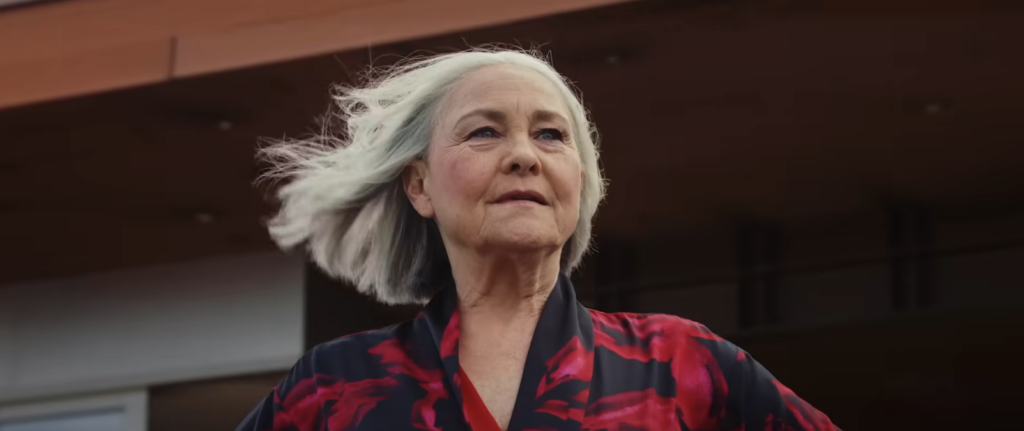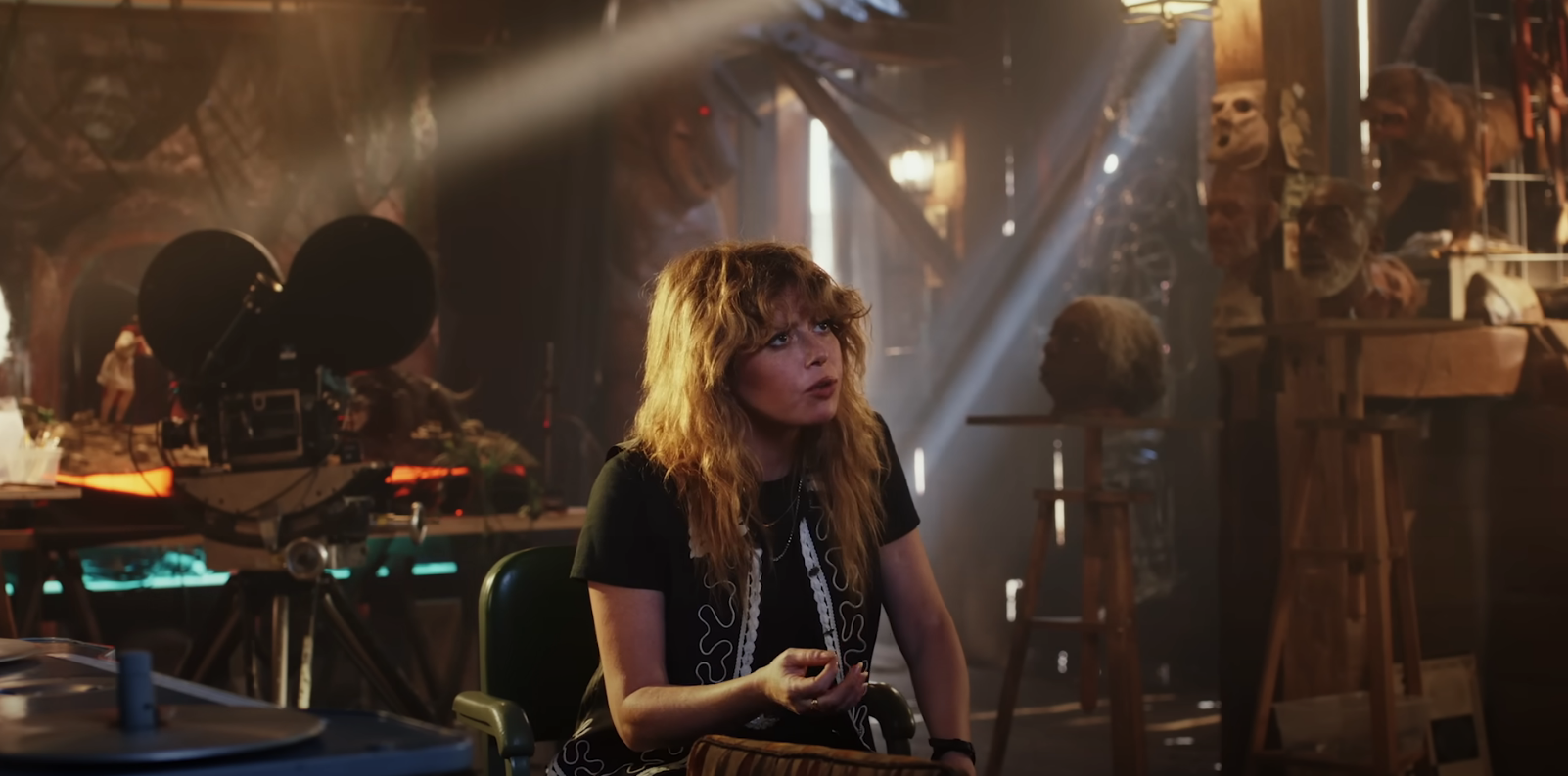The following recap contains spoilers for Poker Face S1E8, “The Orpheus Syndrome” (written by Natasha Lyonne & Alice Ju, and directed by Natasha Lyonne).
It only seems right that the psychologically deepest, weirdest, and most experimental episode of Poker Face yet was written and directed by Natasha Lyonne herself. Though, it must be noted that Lyonne does share writing credit with her Russian Doll partner, Alice Ju. It is difficult to differentiate Lyonne and Ju’s sensibilities and they both have to share total credit for the way “The Orpheus Syndrome” bends into some clear areas of interest for them both. Then Lyonne’s direction takes that up another level, as at the climax Poker Face S1E8 becomes the very experimental stop-motion horror film that Arthur Liptin (Nick Nolte) spent his life trying to create.
Everything about “The Orpheus Syndrome” takes the familiar tropes that Poker Face has already established and cranks the frenetic intensity up to eleven. Charlie Cale (Lyonne) is pulled into an ongoing criminal plot. The guest stars are intense and perfect in their roles. The case of the week is also interesting in its own right. Basically, S1E8 is Poker Face firing on all cylinders (to steal a metaphor from last week) and it shows that the series can reach even greater heights without changing its essential qualities at all.
The Plot
The only changeup to the format this week is that we don’t get a straightforward visual of how the murder happened. Laura (Cherry Jones) chases Max (Tim Russ) out of her house and then he seemingly jumps to his death over the balcony, though not before prophetically intoning that she should “look into [his] eyes.” Then there are some flash-forwards to Laura receiving a life-like bust of Max and she proceeds to ask for forgiveness. We then see the murder, as it turns out Laura had poisoned Max when he came to confront her over how he found that she had been responsible for Lily’s death back in 1989.
Laura uses the replica to access Max’s files and delete the incriminating video, but she also has to destroy the physical copies, which lead her to Raoul (Luis Guzman) and ultimately back to Arthur himself. After making the bust, and with a boost of doubt put into his mind by Charlie, Arthur searches through the film and discovers Laura’s guilt. Unfortunately for him, he makes the now standard move of confronting Laura about it personally. He makes his peace and throws the film into the fire, but Laura is a serial killer and it is too late, she had already poisoned him. He makes it back home just in time to drop dead and be discovered by Charlie.

From there though, “The Orpheus Syndrome” really kicks into overdrive. Laura, Max, and Arthur had been partners in creating an Industrial Light and Magic-like effects studio and Laura ostensibly killed her two partners (and long-time friends) to protect the company as it celebrates its 40th anniversary. It is at the celebration party that Raoul and Charle confront Laura and show the film evidence of her initial crime.
This causes Laura to completely lose the tenuous grip she had been keeping on her sanity, and she winds up running directly into the exhibit she set up to “honor” Arthur, displaying all of his amazing creatures and effects, and becoming a house of horrors from which she cannot escape. As Laura thrashes and whirls through the exhibit, the camera becomes a part of the unraveling of her mind. We are treated to a great number of directorial flourishes, with the camera whipping around and tightly focusing on Cherry Jones’ face. Then the creatures come to life and actually embody the literal ideas they were created to emulate. It is a wild and powerful scene, and then, following Max to the edge once again, and completing another meta-cycle for the show, Laura jumps to her death.
The Guest Stars
The first thought I had upon seeing Tim Russ’s face at the very top of the episode was “wow Tuvok is in this!” But that feeling was set aside as the episode progressed. Russ’s stoicism but underlying expressions actually turn out to be central and essential to the story. Max is not on screen for long but Russ is so memorable and so dynamic, even in limited screen time, that the moments he is on screen really matter. It is clear from the start that no one else could cause so much strife in Laura, and that is the mark of an excellent guest appearance.
Louis Guzman is effective as Raoul and it would not seem right to leave him out of the mentions here, but he is not the caliber of actor of the other guests (or Lyonne) so his role plays out as a purely comedic one, which is still great. Raoul has some fabulous reactions to being set aside by the others and to his fears over having crossed Laura. He was never in any serious danger nor an essential player in the plot though, so all in all, I think it would have been possible to get a lot more out of Guzman.

Cherry Jones however is undeniably compelling as Laura. When Jones won the Tony for Doubt it was because of the depth and humanity she was able to bring to a character who could have just been hatable and horrible; the same is true of her take on Laura. Instead, there is something about the way Jones plays Laura that emphasizes the sadness. When she tells Charlie that she was doing all of these horrible things because she wanted to help everyone by making sure the business succeeds, Charlie believes her. Because at her heart that is what Laura does think she is doing. She is a murderer and a fraud, but Jones is able to make her seem like so much more.
And finally, we come to the most interesting guest star of them all, Nick Nolte’s central performance as Arthur Liptin. Nolte is such an expressive actor in his voice and mannerisms, even though (or perhaps because of) the ravages of time and excess on his body. From Nolte, that raspy mumble of a couple of words is able to convey more than many actors can do with full monologues. Then here he is paired exclusively with Jones and Lyonne and the differences in the scenes are stark and telling.
With Charlie, Arthur’s emotions come out to the surface, probably for the first time in 40 years. He is able to unburden himself in this kindred spirit and allow himself to feel for the first time in a long while. But with Laura, Arthur’s quiet nature takes on a whole other meaning, Nolte holds his body differently and it conveys the intensity and power of a real fighter. Even after he is poisoned, at least until he finally succumbs, the character never loses this profound sense of strength, and that is all from the way Nolte carries himself in the scenes.
Charlie and the “Solve”
The relationship between Charlie and Arthur, and the clear joy that Lyonne gets throughout “The Orpheus Syndrome” from working with Nolte, is truly the heart of the episode. Charlie starts out working at a barber shop but once she has to deliver a bag of hair to “definitely not a serial killer” Arthur she switches over to being his assistant. From there the two of them have a series of deep and lived-in conversations that bring the characters closer together while also commenting on their own dark and troubled lives.
The easy chemistry of the two actors on screen is matched only by the raspy brokenness of their voices. These people have experienced life in a way that most of the viewing public never will, both in the highs and the lows, and that is certainly something Lyonne and Ju’s script brings to these moments. Charlie’s gift is connection, but with Arthur, that connection is even deeper than usual. Even if it wouldn’t work to have them stay together forever.

So of course it is Charlie who brings Arthur to talk about the pains of his past, his guilt over thinking he was the reason Lily died, his dedication to his work as a result, and his inability to leave his workshop out of fear that it might happen again. Instead, Arthur is dedicated to his work, creating disturbing creatures and effects that all have significance to his trauma and the pain he feels. All of which we are left hopeful he was able to process before he died.
Final Thoughts
The bottom line for the Poker Face S1E8 recap is that “The Orpheus Syndrome” is easily my favorite of the series so far. It has everything I would want in a show: great performances, an interesting mystery, and a deep metaphysical examination of the value of living your life and the pain that can come from closing yourself off to the world. Arthur Liptin had a creative talent and a zest for life, but Lily’s death took that away from him. The pain, guilt, and sorrow took away his life long before Laura ever could, but somehow, through a few weeks with Charlie Cale, he did find some measure of peace. And so perhaps it is for all of us, through living and learning with Natasha Lyonne’s ruminations, we can find some of those small lost pieces of ourselves.

